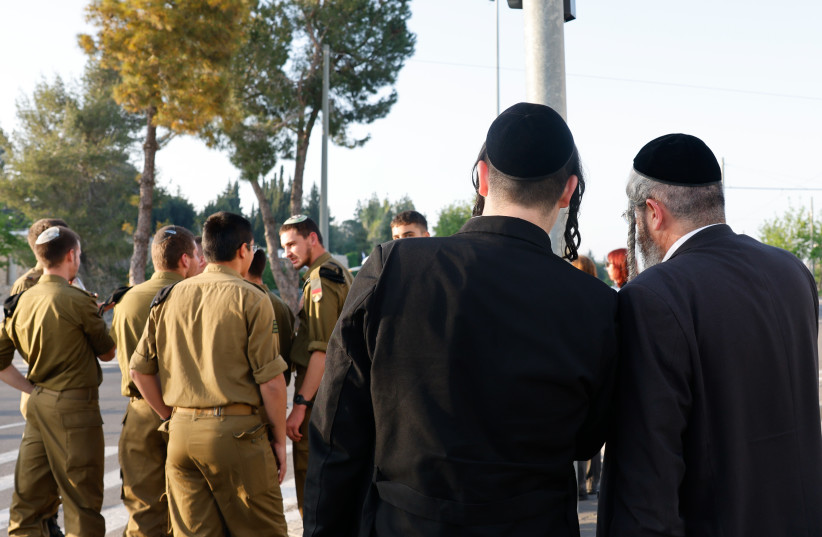In the face of constant threats, Israel remains resilient, thanks to its citizens, without needing to rely on foreign boots on the ground, with countless heroes sacrificing their lives for the nation.
The increase in casualties among soldiers in Gaza, including recently in Rafah and other locations, along with debates in the Knesset and the High Court regarding the draft law, have intensified discussions about expanding the army and which sectors of society contribute less to our collective defense.
The IDF, like any army in the world, needs a large number of soldiers, not exclusively for combat roles. Many serve in intelligence, communications, technology, and logistics. Therefore, anyone who avoids military service harms the IDF’s ability to operate. In light of this, the fight against draft dodgers and those who decide not to complete their full military service must be intensified. Enforcement should be stronger, and public messaging should be unequivocal about the importance of both serving and completing the full term of enlistment.
Military recruitment is necessary to strengthen our ability to defend the borders and for the continued strengthening of the economy. Military service instills values, discipline, and national cohesion, all of which are crucial for maintaining Israel as the Start-up Nation and a growing economic power.
The IDF has demonstrated exceptional adaptability in integrating diverse sectors of Israeli society, enhancing the principle of a people’s army. From women serving alongside men to disabled soldiers; from foreign language speakers to vegans; from lone soldiers to new immigrants; from those facing economic difficulties to outstanding athletes; the IDF has opened its ranks to all sectors. Despite these inclusive efforts, integrating the ultra-Orthodox community remains a challenge. The traditional approach has been to bring haredim into the existing military framework. However, a paradigm shift should be considered: Instead of bringing parts of the haredi community to the IDF, we should bring the IDF to the haredi community.
A new multi-corps unit, tailored for ultra-Orthodox, should be established
To strengthen the people’s army and foster unity, a new multi-corps unit, tailored specifically to ultra-Orthodox institutions willing to participate should be established. This unit would operate from a network of military or civilian yeshivas, integrating military organization into their daily lives. The students would undergo basic, short, and targeted training within their yeshiva environment. These yeshivas would function as fully-fledged military bases, receiving IDF funding. Their students would wear uniforms during the entire day – or only during military tasks, depending on the nature of the yeshiva; they would adhere to schedules as all other soldiers, including obtaining approval from their commander for doctor’s visits and special vacations; and even have to consume military food.

Each yeshiva, in addition to its regular religious studies, would receive a specific military role that could be performed on-site. Tasks would be adapted to the yeshiva’s capabilities and size, ranging from logistics roles, such as sorting equipment, packing combat rations, or photocopying documents, to religious duties, including koshering kitchen utensils for Passover and fixing the IDF’s Torah scrolls. Students wishing to continue a military career could pursue additional training, including participation in an officers course, allowing them to serve in other roles. Some yeshivas might undertake field tasks, such as operating a nearby military checkpoint.
Parts of the haredi community are already undergoing significant changes, weakening the mistaken assumption that their communal framework will remain static. Increasing numbers of this sector are working, living in non-religious cities, traveling abroad, buying luxuries, founding start-ups, and studying at universities. Many have even expressed interest in joining the IDF in the current war and promoted various initiatives for the benefit of serving soldiers and evacuated civilians. The reason for this change is simple: the ultra-Orthodox are responding to the changing economic, social, and current realities of the 21st century.
Integrating the haredim into the IDF through their yeshivot is a unique strategy. But, like the recently disbanded Druze battalion, this multi-corps haredi unit operating from within yeshivas may, in the future, no longer be necessary, as integration becomes the norm and the ultra-Orthodox community gets used to military service and its benefits. Expanding the ranks of those serving in the IDF and enhancing the protection of soldiers’ lives are crucial to our resilience.
The aversion to IDF casualties is a central concern for leaders in democratic societies. Here in Israel, this fear reaches the highest level. Even if Israel had all the legitimacy in the eyes of the world to continue the fight for a decisive victory in Gaza, an increase in the number of casualties would make local public opinion less inclined to continue to support this mission. Unlike the enemy, public opinion in a democracy can move brigades and battalions away from the battlefield.
To strengthen the protection of soldiers’ lives, we must reduce the enemy’s ability to harm them and limit incidents that might quickly sway decision-makers to send fighters into battle. Continued development of the Iron Dome and other defense systems is necessary to protect civilians and because the enemy’s inability to penetrate them can delay or prevent the use of ground forces inside enemy lines, avoiding many soldier casualties.
The missile warning system should be even more precise. We need to stop missile attacks before they reach Israeli airspace, making Color Red sirens unnecessary. Terrorist organizations aim to instill fear and intensify public pressure on the government to act militarily, even if the rockets themselves do not cause any casualties. Expanding the IDF’s autonomous and unmanned capabilities, not only in the air but also on land, will reduce the use of soldiers.
Widening the pool of recruits, along with investing in advanced technologies, will strengthen national security, deepen social cohesion, and ensure that the IDF can continue to protect the country – while maximizing the safety of soldiers.
The writer is a lecturer in the field of civil-military relations, at Hebrew University’s Political Science Department.
